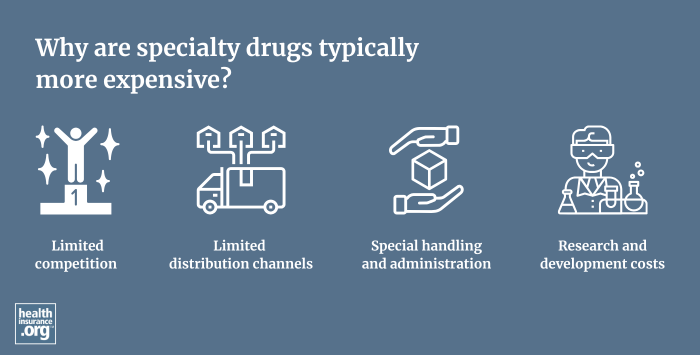
What is a specialty drug?
Specialty drugs are high-cost prescription medications used to treat complex, chronic conditions like cancer, rheumatoid arthritis, and multiple sclerosis. Specialty drugs are often biologic, meaning they're derived from living organisms rather than chemicals.1
Specialty drugs are very expensive. Although most people do not take specialty drugs, they make up the majority of drug spending. And they also make up the majority of new drugs coming on the market. In 1990, there were only ten approved specialty drugs, while today there are more than 400.2
Specialty drugs sometimes require special handling and administration (typically injection or infusion), and patients using a specialty drug may need careful oversight from a health care provider who can watch for side effects and ensure that the medication is working as intended.
Specialty drugs might be covered through either medical or prescription drug insurance. How a specialty drug is covered usually depends on where the patient receives the drug. If the patient takes a pill or self-injects the drug at home, it is more likely to be covered through his or her prescription drug benefit. If the patient receives the drug at a doctor's office or an outpatient clinic, it's more likely to be covered through the medical benefits portion of his or her health insurance coverage.
Many prescription drug plans that cover specialty drugs have a separate "tier" that specifies how much an individual has to pay for specialty drugs. Individuals may be required to pay a percentage of the drug cost or a flat-dollar copay. Copays are fairly rare for specialty drugs (it's more common for plans to require patients to pay a percentage of the cost instead), but when they are used, they tend to be several hundred dollars.
There are several states, however, that have capped patients' out-of-pocket costs for specialty drugs. And many drugs manufacturers offer patient assistance programs to help people with and without insurance get access to specialty drugs. For Medicare beneficiaries, Medicare Part D prescription drug coverage has an out-of-pocket cap of $2,000 in 2025, regardless of the price of an enrollee's covered drugs.
Footnotes
- "What's the Difference Between a Specialty Drug and a Non-Specialty Drug?" Truveris. June 18, 2021 ⤶
- "Specialty drug growth is here to stay" Carelon Rx. Jan. 24, 2024 ⤶


